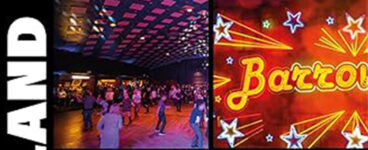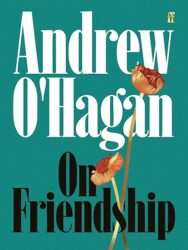‘In eight elegant essays, O’Hagan expands his thoughts on friendship to include lost friends, pets, imaginary friends, and workmates.’
David Robinson finds a lot to love in Andrew O’ Hagan’s collection of essays On Friendship.
On Friendship
By Andrew O’ Hagan
Published by Faber
One day next spring I will climb Cairnpapple Hill. I will only go on a clear day, because the whole point of Cairnpapple Hill – about three miles north-east of Bathgate - is that from it you can see both of Scotland’s coasts. It is, Wikipedia tells me, a Marilyn (meaning that it is at least 150m high) and has been used as a ritual site for at least 4,000 years. That’s two facts I didn’t know, and when I check how far away it is, there’s a third: by car it will only take me 45 minutes to get there. Easy.
Yet when I do go up Cairnpapple Hill (the site reopens in April), it won’t be for any of those reasons. It will be because of Andrew O’Hagan’s latest book, On Friendship. In it, he writes about walking there with his friends Karl Miller, the writer, critic and founding editor of the London Review of Books (where O’Hagan is editor-at-large), and Seamus Heaney. I have interviewed Miller once, O’Hagan four or five times, and Heaney not at all. I can imagine their friendship – just – but I can’t imagine the view.
Both Heaney and Miller are dead now, but that hasn’t wiped them from O’Hagan’s consciousness. If anything, the opposite has happened. ‘Death,’ O’Hagan writes, ‘doesn’t really end friendship; it sanctifies it. It makes the closeness permanent.’ Or again: ‘The greatest friendships can never really end. They embody one’s basic faith in togetherness: you are just another body suspended in air until someone puts out a hand to you.’
Look again at those quotes and try to find grief in them. If it is there at all, it is buried in gratitude, or appreciation of how friendship brings out the deepest joys in life – ‘all the sweets of being’ in Boswell’s phrase from A Journal of a Tour to the Hebrides as he looked back on the conversations he had enjoyed with Samuel Johnson.
O’Hagan’s friendship with Heaney, Edna O’Brien and so many more leading writers mentioned in this book – sometimes while making their own tours in these islands – is similarly joyous and vitalising. Nor is it remotely one-sided: the framed and personally inscribed manuscript of Heaney’s poem ‘Postscript’ in his Primrose Hill home is testament to that, as is the fact that O’Brien chose him to give her eulogy at her funeral last year. Proof, if any were needed, that alongside his talents as a writer, Andrew O’Hagan has an impressive talent for friendship too.
We already knew that from his ‘almost completely autobiographical’ (his words) 2020 novel Mayflies. In it, Jimmy, the bookish teenage narrator, goes with his best friend Tully and their working-class Ayrshire mates on a booze-and drug-fuelled weekend of music and mayhem in 1986 Manchester. Thirty years later, when he has carved out a successful career as a writer in London, Tully tells him he has terminal cancer and asks him to ‘help him across the line’.
That happened in real life when Keith Martin – the charismatic lead singer in their short-lived band Big Gun – got in touch in 2017. O’Hagan was already well into writing what he had always planned to be his magnum opus, Caledonian Road, a state-of-the-nation novel (61 characters, 641 pages, 10 years in the writing) which covers an almost indecently wide stretch of society, ranging from polo-playing royal hangers-on at Windsor to Bangladeshi women sweatshop workers in Leicester. But the demands of friendship couldn’t wait, and he put it aside to work on the narrower, but arguably deeper canvas of a 1980s teenage kicks seen through the prism of a middle-age Scottish litterateur in London.
On most readings, those two worlds don’t mix. The successful Scot returns 30 years on and is embarrassed, or condescends, or feels guilty. He has left his roots behind, grown out of his long-ago friends, gone on to better things. Yet that’s not the story in Mayflies, nor is it the story in O’Hagan’s own life. His working-class teenage friends, he insists, were as bright and sparky as any he has met since, even though as editor-at-large at the London Review of Books, he met any number of bright and sparky people. In fiction as in real life Jimmy/O’Hagan doesn’t dream of quietly dropping them. Because not only can true friendships endure, but sometimes the people that we meet when we are still only partially grown-up are the best people we ever will meet.
There is, in other words, an impressive social breadth behind O’Hagan’s writing in general and his writing about friendship in particular. Keith Martin’s death made him realise that ‘friendship was a subject that had laid unannounced at the centre of my writing life’. In On Friendship he puts it in focus, from the early friendships formed with neighbouring boys on his Irvine scheme (‘the first great challenge of our social lives is to find a friend who might somehow match our capacity for wonder’) to arranging a first meeting with Edna O’Brien for dinner at the Wolsey (‘Ask for the corner table,’ she tells him. ‘Lucien Freud’s table. If he’s not there they always give it to me.’)
In eight elegant essays, O’Hagan expands his thoughts on friendship to include lost friends, pets, imaginary friends, and workmates. Throughout, he insists on its importance: as great or greater, in most of our lives, than romantic love. A good friend, he says, ‘is a lesson in empathy that no one can do without’, but he sets the bar high. Friendship demands the best of us: not taking offence when offence is implied; resisting making everything about you; being generous when down on your luck; lightening someone else’s mood when feeling low yourself; defending your friend when it would be easier to keep quiet or drop in a bit of poisonous gossip. And because true friendship IS so important, it’s pointless wasting one’s time on false friends, those ‘who think everybody is a contact’, and those who just enjoy the psychodrama of involving someone else in their own angst.
Maybe, he fears, true friendship is becoming rarer. Perhaps the nature of friendship did indeed change between 1990 and 2010 with the advent of the internet and social media. As I write this, for example, a story appears in my news feed telling me that 54 per cent of Americans ‘have some sort of relationship with an artificial intelligence platform’ and that for 28 per cent of them that relationship was ‘intimate or romantic’. What does this mean for friendship? Will our best friends soon be bots? Has ‘friending’ someone on Facebook, Instagram or Twitter, where we know precisely what version of themselves they want to project to the world, replaced befriending someone in real life when we find out what they think for ourselves?
Yet even such a potentially wonderful thing as true friendship has limits. Sex is one of them, but so too is asking a question like ‘What do you really think of me?’ Walking up Cairnpapple Hill or anywhere else, a true friend wouldn’t need to ask.
On Friendship by Andrew O’Hagan is published by Faber, priced £12.99.
ALSO IN THIS ISSUE

 Brutal Scotland by Simon Phipps
Brutal Scotland by Simon Phipps
‘As I travelled, I wasn’t only drawn to buildings. I began documenting public art – those often abst …

 Barrowland: The Inside Story of Glasgow’s Beloved Ballroom
Barrowland: The Inside Story of Glasgow’s Beloved Ballroom
‘Imagine having an Access All Areas pass to one of the greatest music venues in the world: the Barro …













